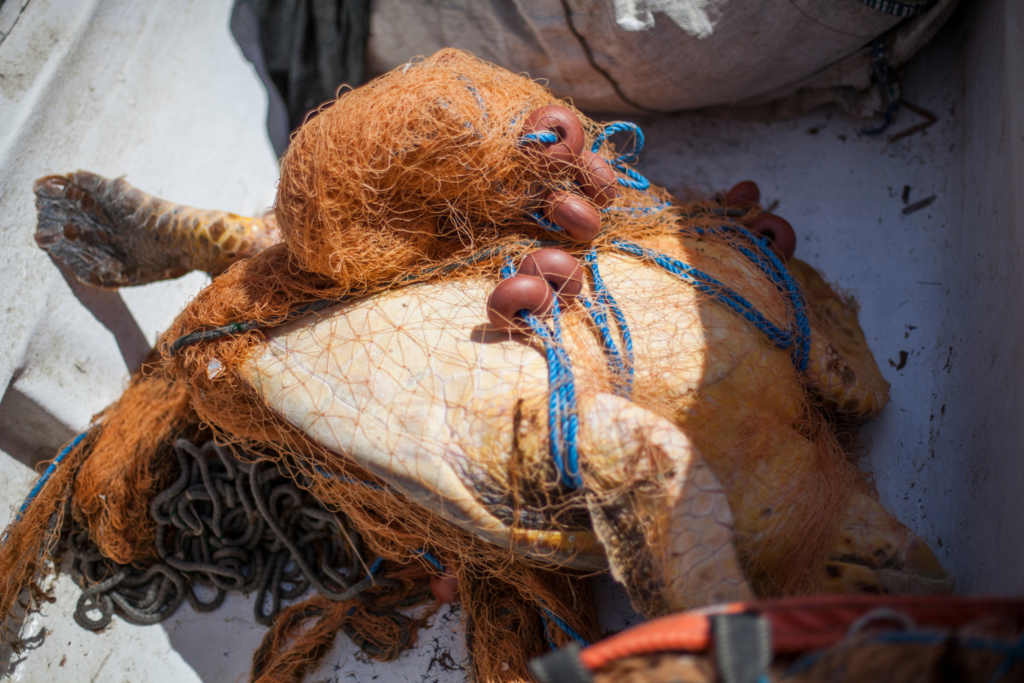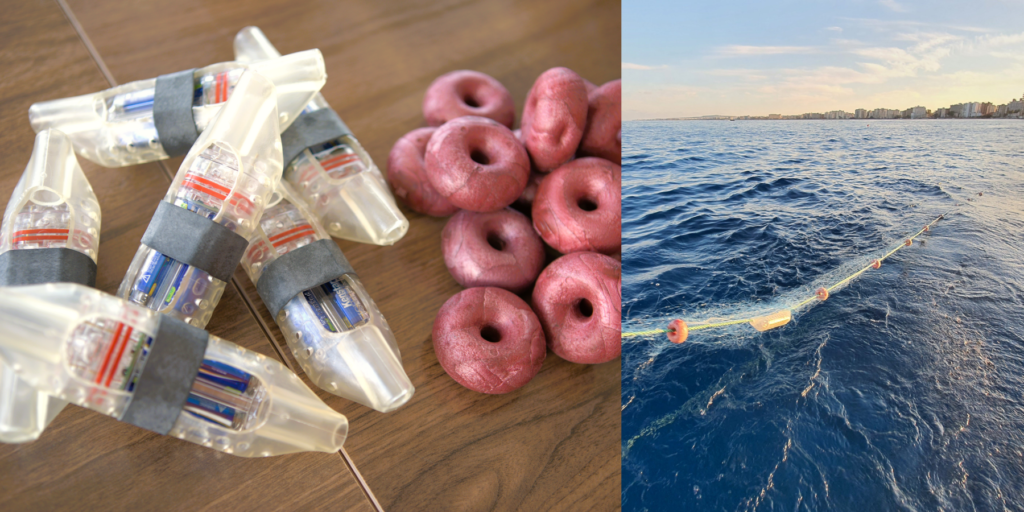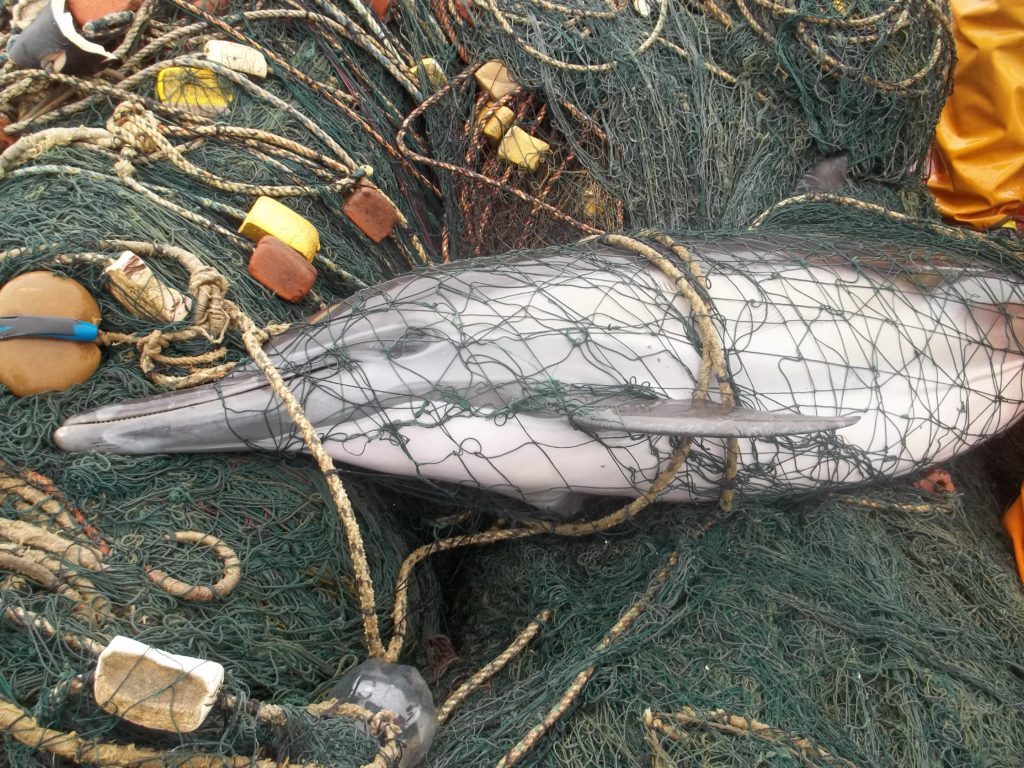Incidental capture of non-target species, also known as bycatch, in fishing gear is one of the greatest threats to populations of numerous endangered, threatened, and protected marine species across the globe. Bycatch reduction is a complex problem – with multiple social, cultural and economic challenges. Finding ways to mitigate and manage bycatch requires urgent action, tangible solutions, and comprehensive collaboration between industries. This is a key area of research at the University of Exeter, and one of our main partners is Fishtek Marine.
Fishtek Marine is a pioneering conservation engineering company that brings together the valuable combination of award-winning engineering and fisheries expertise. In a seven year partnership with researchers at the University of Exeter, the two teams have dedicated their combined endeavours to design, distribution and testing of a range of innovative technical devices aimed at reducing bycatch in industrial and small-scale fisheries. Their work spans multiple marine species and methods, and their success has established Fishtek Marine as a global leader in bycatch mitigation.
In this article, we explore some of the technologies Fishtek Marine have developed, and how some of the impact of these innovative devices has been demonstrated by our collaborative research, sponsored by OceanKind and Schmidt Marine Technologies.

NetLights
Based on the growing body of evidence that illumination of fishing gear can effectively reduce marine bycatch, Fishtek Marine developed the NetLight, a product designed to reduce bycatch and entanglement of sea turtles, small cetaceans, and seabirds. Beyond the threat to marine life, bycatch also damages gear and costs fishers’ time.
NetLights are small, long-lasting, robust devices that can easily be attached to the ropes on fishing nets to alert non-target species to the presence of the net, enabling them to avoid entanglement. They are designed with fishers in mind, seeking to make an easy-to-use device that has little impact on normal fishing operations or target catch rates.
In 2024, researchers from the University of Exeter and SPOT Marine Life tested NetLights in a small-scale fishing fleet in Cyprus, investigating their effectiveness in reducing bycatch of vulnerable species. NetLights reduced sea turtle and batoid (skates and rays) bycatch by 42% and 50%, respectively, without effect on commercially targeted or commercially threatening invasive species.

PotLights
Innovative work on illumination continues, with the ground-breaking discovery that scallops can be attracted to static fishing pots using LED lights. The story began in 2019 when a Cornish crab fisherman, using a single white PotLight inside a commercial pot, noticed an unexpected presence of scallops in catches. This surprising finding led to another Fishtek-Exeter collaboration and the first scientific documentation of scallops’ attraction to static fishing gear using LED lights, which fittingly later became dubbed ‘Disco Scallops’.
The discovery opened the door to new, low-impact methods to catch scallops, one that may redefine the marine industry. This approach has the potential to minimise damage to important aquatic ecosystems, particularly when compared to traditional methods such as dredging, which has a high impact on the seabed due to their heavy and penetrative design.
Following the success of the original discovery in 2019, Fishtek Marine have been working extensively to optimise the pot and PotLight designs to ensure that scallops can be harvested effectively without impacting fisheries operations or crustacean catches. The technology is now shared to the wider world through Disco Scallops, a seafood production company who invite fishers from across the UK to purchase the potting equipment and sell their scallops through them.
Technologies and techniques that improve catch efficiency and selectivity, while reducing bycatch and minimising habitat damage are central to the development of environmentally low-impact fishing methods. Research into other avenues for PotLights continues, with a study in 2024 conducted to assess the effects of illumination on catch and bycatch when targeting northern shrimp across various pot designs.

SharkGuard
Over a third of shark species are threatened with extinction, with many pelagic species such as blue, thresher, hammerhead, oceanic white tip, and mako sharks often bycaught in longline fisheries. The problem with solving this issue arises from the way both sharks and target catch (e.g. tuna and billfish) interact with longline gear, feeding on similar prey and occupying the same marine zones.
Enter SharkGuard, Fishtek Marine’s groundbreaking technology designed to protect sharks without compromising target catch. The innovative technology takes advantage of sharks’ sensitivity to electrical fields and is enough to deter sharks and other elasmobranchs from interacting with the fishing gear. SharkGuard units, when fitted to longline hooks have been shown to dramatically reduce shark bycatch while leaving target catch rates largely unaffected. Trials have consistently shown impressive results. In 2021, tests in the Mediterranean revealed a 91% reduction in blue shark bycatch and a 71% reduction in pelagic stingray bycatch, all without significantly affecting target tuna catch rates.
These findings suggest that if SharkGuard were scaled up globally, it could drastically reduce shark bycatch, and such promising results have been impressive enough to land the innovative technology a nomination for the 2024 Earthshot Prize. SharkGuard continues to be trialled in different environments and species, with large-scale trials to commence in New Caledonia at the end of 2025.

Acoustic Pingers
For the past 8 years, Fishtek Marine have worked collaboratively to be able to offer a low cost, durable, and practical acoustic deterrent that effectively prevents marine mammal bycatch: The Banana Pinger. Pingers work by emitting a repetitive noise, or “ping”, which can be heard by whales, dolphins, and porpoises to highlights the presence of nets, significantly preventing accidental entanglement, or bycatch.
Independent scientific studies have consistently demonstrated that when the banana pinger is attached to nets, detection rates of cetaceans around nets fall. In a 2020 study with the University of Exeter and Cornwall Wildlife Trust on harbour porpoises off Cornwall, researchers found they were 37% less likely to be found close to an active pinger with no evidence of displacement of cetaceans from the area – an associated large concern regarding acoustic deterrents.

Fishtek Marine’s direct research and engagement work on innovative fisheries technologies demonstrates how we can drive crucial change to minimise the impacts from fisheries on marine ecosystems. By working directly with fishers and creating practical, effective, and commercially viable bycatch reduction technologies, Fishtek Marine shows how science and the marine industry can collaborate to protect vulnerable marine ecosystems while considering the future of fisheries. We are proud to work with the company so closely.
Find out more about Fishtek Marine’s range of bycatch reduction technologies, and learn more about the University of Exeter’s collaborative inputs here.

